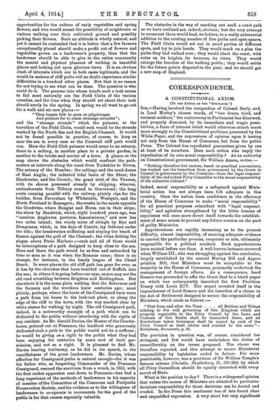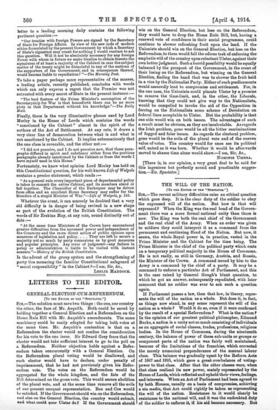CORRESPONDENCE.
A CONSTITUTIONAL AXIOM.
[To ass EDITOR Or sass ..SPECinym.] Sut,—Having involved the resignation of Colonel Seely, and, in Lord Morley's chosen words, of "two brave, tried, and eminent soldiers," the controversy in Parliament has disarmed, and properly disarmed, by its immediate and tragic possi- bilities, a force of interest which would otherwise attach much more strongly to the Constitutional problems presented by the White Paper, and the expressions of opinion upon it issuing not only from the House of Commons, but from the public Press. The Cabinet has repudiated guarantees given by one at least of its members. Does such action also imply the repudiation of its own moral responsibility P As an authority on Constitutional government, Sir William Anson, writes
"Nothing therefore but custom, based on practical convenience, has worked out the transition from government by the Crown in Council to government by the Commons—from the legal responsi- bility of the individual Privy Councillor to the moral responsibility of the collective Cabinet," Indeed, moral responsibility as a safeguard against Minis- terial action has not always been felt adequate in this country. Once the nation loses confidence in the efficiency of the House of Commons to make "moral responsibility" for all practical purposes coincident with "legal responsi- bility," and agitation strengthened by the bitter lessons of experience will once more direct itself towards the establish- ment of some means to prevent any future evasion on the part of guilty Ministries.
Apprehensions are rapidly increasing as to the present difficulty, almost impossibility, of securing adequate evidence to convict the particular persons, corporate or sole, ultimately responsible for a political misdeed. Such apprehensions have existed before our time. A well-known instance occurred when William III., who was struggling against the conclusion, largely established by the annual Mutiny Bill and Appro- priation Bill, that Ministers must be acceptable to the majority in the House of Commons, personally undertook the management of foreign affairs. As a consequence, Lord Somers was persuaded to affix the Great Seal to a blank paper on which was subsequently inscribed the Brat Partition Treaty with Louis XIV. The sequel revealed itself in the impeachment of Lord Somers and the insertion of a clause in the Act of Settlement designed to secure the responsibility of Ministers, which reads as follows :— "That from and after the Time . . all Matters and Things relating to the well governing of this Kingdom which are properly cognisable in the Privy Council by the Laws and Customs of this Realm shall be transacted there, and all Resolutions taken thereupon shall be signed by such of the Privy Council as shall advise and consent to the same."— Robertson, Documents, p. 91.
The provision in question was, of course, considered too stringent, and few would have undertaken the duties of councillorship on the terms proposed. The clause was therefore repealed, and this attempt to secure Ministerial responsibility by legislation ended in failure. Far more practicable, however, was a provision of Sir William Temple's famous scheme (Christie, Shaftesbury, II., 325-326) by which all Privy Councillors should be equally entrusted with every secret of State.
What is the position to-day P There is a widespread opinion that unless the names of Ministers are attached to particular decisions responsibility for those decisions can be denied and evaded. In the Press this sentiment has of late found clear and unqualified expression. A very alma but very significant
letter to a leading morning daily contains the following pertinent question
"Our treaties with foreign Powers are signed by the Secretary of State for Foreign Affairs. In view of the new code of modern ethics formulated by the present Government by which a Secretary of State's signature may count for nothing I would venture to ask this question. Will it not be absolutely necessary for any foreign Power with whom in future we make treaties to obtain thereto the signatures of at least a majority of the Cabinet in case the subject matter of the treaty might be distasteful to any of the sections of the supporters of the Government, and in consequence thereof, would become liable to repudiation ?"—The Morning Post.
To take a paper perhaps more representative of the masses, a leading article, recently published, concludes with words which can only express a regret that the Premier was not entrusted with every secret of State in the present instance :—
"The best feature of the Prime Minister's assumption of the Secretaryship for War is that henceforth there can be no more plots in that Department without his knowledge."—The Daily Mail.
Finally, there is the very illuminative phrase used by Lord Morley in the House of Lords which contains the words "sanctioned by the Cabinet" almost in the spirit of the authors of the Act of Settlement. At any rate, it draws a very clear line of demarcation between what is and what is not sanctioned by the Cabinet. It implies subconsciously that the one class is revocable, and the other not "I did not perceive, and I do not perceive now, that these para- graphs differed in spirit and substance either from the previous paragraphs already sanctioned by the Cabinet or from the words I have myself used in this House."
Fortunately, we know what opinion Lord Morley has held on this Constitutional question, for his well-known Life of Walpole contains a precise statement, which reads :—
" As a general rule every important piece of departmental policy is taken to commit the entire Cabinet, and its members stand or fall together. The Chancellor of the Exchequer may be driven from office and an excellent Home Secretary may suffer for the blunders of a stupid Minister of War."—Life cf Walpole, p. 156.
Whatever the event, it can scarcely be doubted that a very old difficulty is in danger of being revived in a new shape as part of the evolution of the British Constitution. The words of Sir Erskine May, at any rate, sound distinctly out of date :-
"At the same time Ministers of the Crown have encountered greater difficulties from the increased power and independence of the Commons and the more direct action of public opinion upon measures of legislation and policy. . . . They are left to secure a majority not so much by party connexions as by good measures and popular principles. Any error of judgment—any failure in policy or administration is liable to be visited with instant censure."—History of the British Constitution.
Is the advent of the group system and the strengthening of party ties menacing the familiar Constitutional safeguard of " moral responsibility " in the Cabinet ?--I am, Sir, Ac.,
LESLIE HADDOCK.















































 Previous page
Previous page